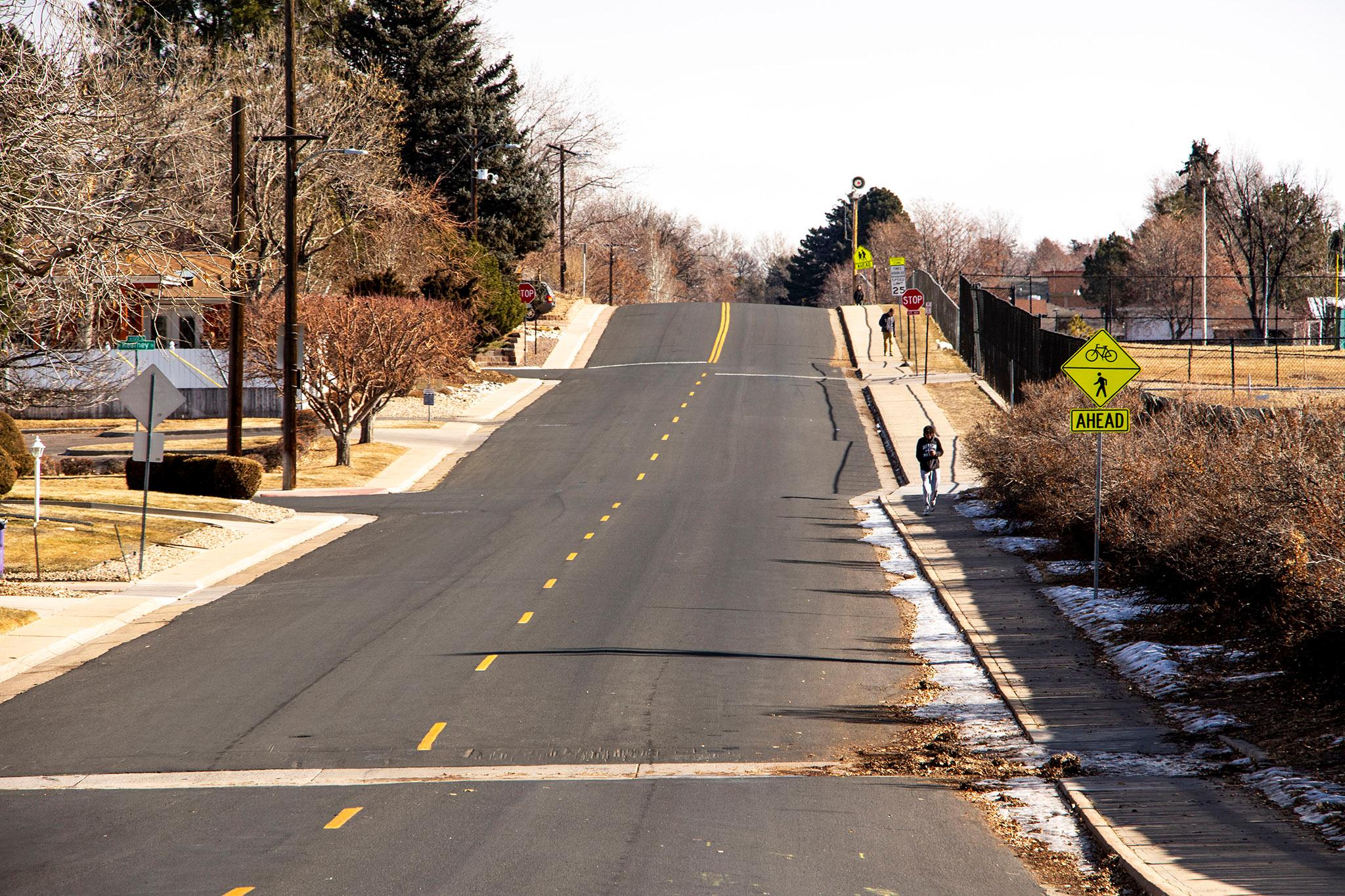Denver's transportation department wants to make Virginia Avenue safer for people on bikes but some locals in Washington Virginia Vale -- and their councilwoman -- are pumping the brakes.
The bike lane would run for about a mile between Jersey Street and Quebec Street. It would include a painted buffer meant to provide extra space between bicyclists and cars, and would repurpose public street space currently being used for parking private vehicles.
Tim Rooney, who heads the Winston Downs Community Association, said city transportation planners did not prep his neighborhood well enough for the loss of parking along Virginia. Staffers from the Denver Department of Transportation and Infrastructure, or DOTI, presented the plan during a tense public meeting Tuesday night.
"Even with additional information, I can't imagine that we as a (registered neighborhood organization) can support eliminating all of the parking on Virginia for all of these residents," he told Denverite, adding that the board has not taken an official position. "I don't know how we could possibly justify that to the homeowners in this neighborhood."
Every house fronting Virginia Avenue on this stretch has a driveway with a garage. The street is barely used for parking in the evenings and on weekends, according to the transportation department's inventory. Of the estimated 231 available parking spots, four were being used between 7 and 9 p.m. on a weeknight, city documents show. Staffers counted 10 being used on the weekend between 1 and 3 p.m.
Those counts aren't as relevant to weekdays when two schools along the street -- George Washington High School and Denver Green School -- are in session, Rooney said. Both schools have parking lots, but the bike lane would supplant a drop-off and pick-up zone alongside the Green School and eliminate on-street parking near both.
Denverite found Virginia Avenue between Jersey and Quebec nearly barren of parked cars at noon Thursday, with one car parked illegally in the drop-off zone.
G.W. administrators expressed no concern, said Nancy Kuhn, a spokeswoman for the transportation department. Green School staffers expressed concerns but also "indicated a willingness to work with us and an openness to receiving suggestions for how to accommodate staff parking and drop off conditions on side streets," Kuhn said.
Kuhn said DOTI will do a broader parking analysis and will address other neighborhood fears, including trash and recycling pickup and concerns about residents becoming disabled and needing a special parking space.
Denver's goal of laying down its bike network faster seems to have met its first speed bump in the form of wary neighbors.
"What I think happened in this situation is, (DOTI's) 2020 New Year's resolution was to move faster," Councilwoman Amanda Sawyer told Denverite. "This was their first attempt to do that and they just failed a little bit."
Sawyer said she has not taken a position on the bike lane, which is in her district, but said she has concerns about parking and qualms with the process. It happened too quickly and haphazardly, she said, though she added DOTI is taking neighborhood concerns seriously. Sawyer said she knew about the meeting beforehand but resented that the bike lane design was presented as a "done deal."
A planned bike lane on Virginia Avenue has been on the books since 2011, when Denver Public Works released Denver Moves, its plan for the bicycle network, after a public process. Eight years later, Denver has committed to realizing a large chunk of that plan by 2023 with more rapid implementation -- partly by combining striping with paving operations.
"We need these important mobility projects on the ground now," said Piep van Heuven, who co-chairs the Denver Streets Partnership, a group that advocates for better walking, biking and transit. "They increase transportation options, keep kids and families safe, and address the climate crisis. Many of these projects have been vetted through public processes several times over already, and we can't afford to slow the process over personal parking concerns. Ultimately safety and mobility have to be our first priority, and sometimes that takes tradeoffs."
In the past, bike lanes available to all city residents have been watered down because of a few private residents' concerns about parking. See: Stout Street in Curtis Park.
In a statement, DOTI spokeswoman Kuhn said the transportation department "is committed to implementing a network of better bike facilities in our city that make it more comfortable and viable for people to ride bikes -- and to creating a bike network that connects people to the places they want to go."
Paving and implementation is scheduled for this summer.
Correction: Tim Rooney's name was originally misspelled in this story.












